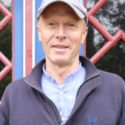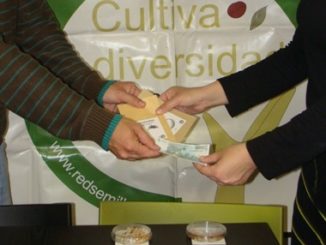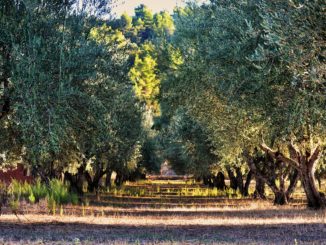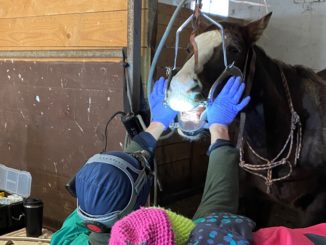
Welcome to the gardens of St John’s monastery in the village of Anatoli, Thessaly, Greece. We bring you a heartwarming story of sharing and sufficiency, in a letter from a visit to the farm by Hannes Lorenzen.
The winding road takes us slowly up from the valley of Larissa into the mountain of Kissavos. Looking back, we see the many fields still glistening with water, remnants of the flood which struck the entire region of Thessaly on September 23. Many cities, villages and farms were devastated, leaving the rural population struggling still today for something that once seemed normal. Thessaly used to be one of the most productive farming areas of Greece. It had never before seen such a drastic impact of instant heavy rainfalls.

We reach the small village of Anatoli, meaning sunrise in Greek, in the late afternoon. Sister Theochariti welcomes us at the gate of St John the Baptist’s monastery. She guides and supports us throughout our stay. She is one of the twenty-two nuns who manage an impressive mosaic of animals, gardens and buildings. She leads us to our “cells”, nicely arranged bedrooms in monastery style. For guests they are arranged with a small bathroom and a tea corner. “If you like, you are welcome at our afternoon service in the chapel,” she smiles. We do, and we gladly follow her. At St John’s chapel (2004), we quickly dive into a flow of Orthodox chanting and recitations, dim candle light and incense.

During the service we have heard prayers in various languages. “It is true, we pray together in many mother tongues,” Theochariti explains. “Each of my sisters has come here for a very personal reason of spiritual search. Whether from China, Japan, America or Europe, we have found a new way of life here. We have discovered our talents and strengths, but also our limits and needs. Being part of this community means to serve and praise God and that includes helping each other, as well as supporting people outside the monastery who need help.”
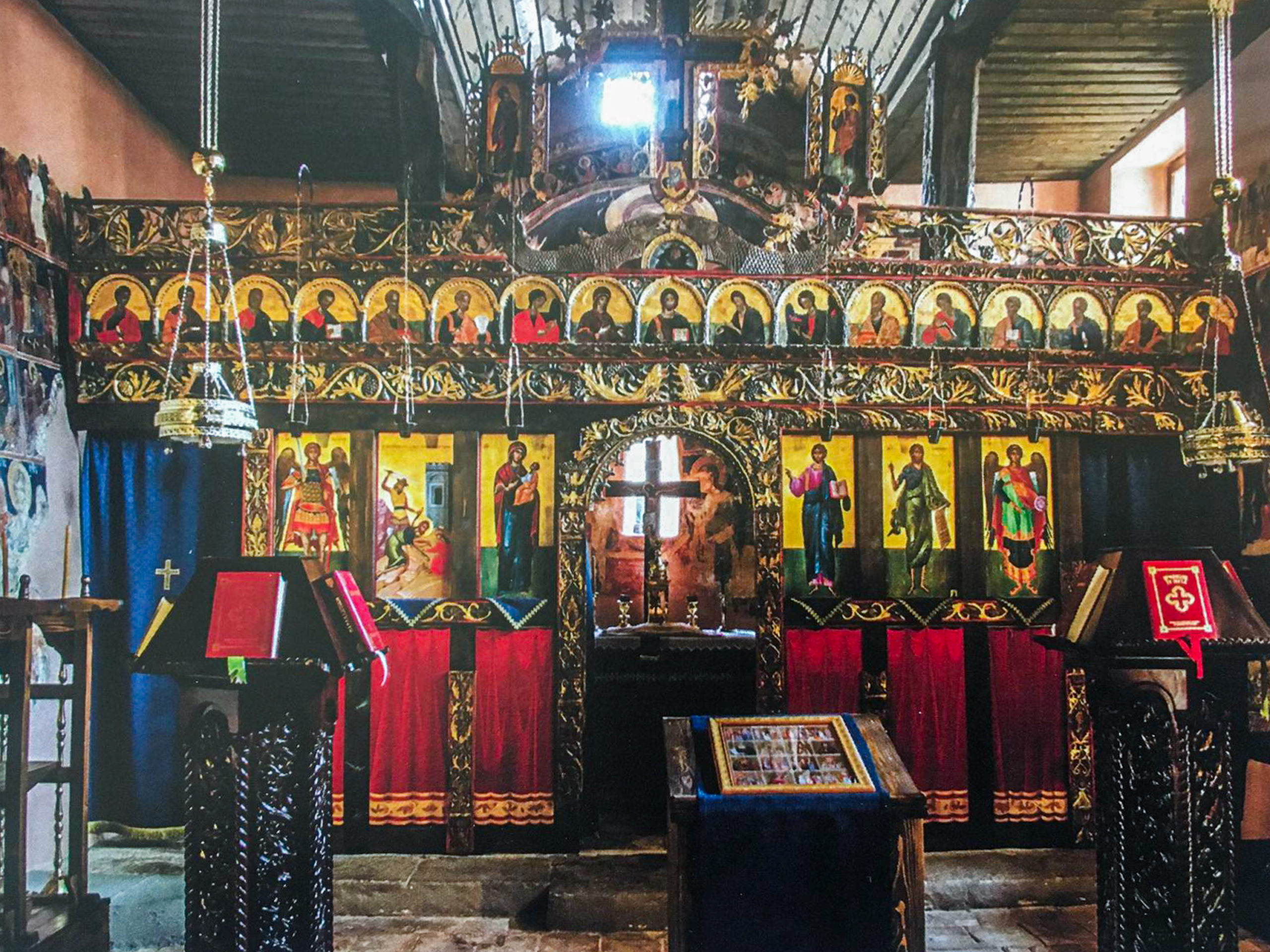
Before sunset we are guided through a fascinating labyrinth of restored and newly built rooms, chapels, meeting spaces, workshops and guest rooms, embraced by fruit trees, vegetable gardens and herbal beds, meadows and stables, and thousand-year-old oak woods. This place seems to carefully intertwine the past with the presence, arranged like a multi-piece puzzle of nature and functional order to adapt to its needs. At the stables we meet sister Theosemni who introduces us to a curious flock of goats. We are guests of sister Theodoxi who milks the cows and sister Theosemni who milks the sheep. All animals are calm and in good health, they walk by majestically…

The stables were designed and constructed by the sisters. Sister Theodoxi passes us with a hay bale on a forklift. It smells like a bouquet of summer flowers. “During winter our animals are fed barley sprouts that we produce here. They are just crazy for it,” she explains. Our sheep and goat feta cheese therefore has a special aroma, even in winter when they cannot graze outside.”
Why have we come here? Because the sisters invited us. They leave the monastery not only to sell their products, but to offer their seeds to families, gardeners and farmers. We met them at a seed festival in another part of Greece – in Drama where Peliti has its annual Seed-Keepers gathering in spring. There are many other organic festivals in the country where the local people sell their products.
We planned our tour across the country this May with the aim of visiting the monastery and a number of farmers and seed projects in the region. We were curious to discover the place that gives the nuns such unique energy. We wanted to experience some of the various organic and cultural movements that flourish in Greece today.

“Ecology means caring of our ‘house’, that is, nature, God’s creation”, says Abbess Theodekti. “There is no difference among them, they are all one.” She has invited us for a chat to the reception area of the main building. Opposite the entrance, icons of the Theotokos, the Apostles and St John catch our attention. We also discover pictures of the monastery taken when the sisters first arrived here from Athens. Abbess Theodekti shares with us the story of how she and two other nuns arrived in the village of Anatoli and the abandoned monastery of St John:
“In the year 2000 our life in the monastery at Lavrion, near Athens, was threatened by works planned for a highway and new airport for the 2004 Olympic games in Greece. Access to water became extremely limited, our garden was destroyed, and our animals were suffering. Initially we just looked for a place to wash our carpets. Then two of our sisters from Thessaly suggested we come to a place in Agia, near Anatoli for that. We came here and a friend suggested we visit the abandoned monastery of St John. We visited the ruins and returned to Lavrion. A few days later, a shepherd friend who pastured his goats and sheep near Athens, told us that he was forced to leave his area because of the Olympic Games. He told us that he found a monastery and asked us to help move his sheep to Anatoli. That was it. We returned to Anatoli equipped with tools, sleeping bags and a lot of courage and determination to make it our new home.
“After we decided to move to the mountain here, long years of hard work followed. We have been learning by doing. We became bricklayers, carpenters, and roof builders. We were already gardeners and farmers. But the monastery asked for more and we were ready for that. We found a ruin and we had a vision for it , that could be attained. We could not imagine how long it would take to achieve our vision when we arrived 24 years ago. We suffered from cold and heat. But it was worth it. People from the village were very supportive.
“The actual moving here from Athens was a masterpiece of detailed logistics. We milked the cows, sheep and goats in Athens early in the morning on the 15th of May 2001; and in the evening of the same day they were here at the monastery of St John more than 400 km north to be milked again. Today we celebrate the 24th anniversary of that amazing day!”

When the Abbess speaks, we can feel the gratefulness for what this community of monastics with God’s help has been able to achieve. But we also grasp her deep concerns about the state of life on this planet: ”Ecology – our common ‘house’ – is in a worrying disorder. We already lost paradise once. Now the state of things seems to be even worse. The way we deal with the biological world destroys the fertility of the soil and the diversity of plants – and animals are treated as if they are machines. Here we practice love for the creation and we encourage others to do the same. Seeds are one of the ways we reach out to the people in the village, at our shops, at the markets, at organic festivals and seed exchanges. Seeds are the beginning of the transformation we need. We offer more than a thousand seed samples for free to people each year.”

The Abbess takes us to the treasure room of the monastery’s seeds. She also walks us through an endless corridor of workshop rooms for carpentry, mosaics, icon making… and finally to a room for cutting meat. The previous day two sisters had taken a bull and a cow to a slaughter house, and now they were cutting, portioning, weighing, vacuum packing and labeling the meat. All nuns not urgently needed elsewhere were helping, working hand-in-hand to accomplish the colossal task.

We raise a question: Love for animals and slaughter? Is there a way to unite love and slaughter?
The answer of the sisters is this: “We manage a herd of animals to produce meat and dairy for people, dairy for ourselves, manure and fertilization for our soil and plants. Our fields, meadows and woods are a vibrant farm. The animals have a wonderful life, are treated and fed very well. And our customers get very good meat.
“As vegetarians we offer our abstention from eating meat to God. We have other sufficient food from the animals and the garden and we are happy to offer the meat to people who esteem our efforts. Everything has its value. ”
We understood. We admire the calm cooperation of the nuns in the meat room. They work almost two days and long evenings to complete the task.

The list of products which can be bought from the monastery is quite amazing. Their main products are their dairy products made from their cows, sheep and goats, feta cheese and many other hard cheese varieties; pasteurised milk and fresh cheese; eggs, meat from all animals; a broad variety of herbs and natural medicinal products; oils; processed jams and pickled vegetables. Together with the people who are staying to help (Wwoofers) we are spoiled at our breakfasts, lunches and dinners with delicious meals derived directly from their from their farm and garden.

One morning Sister Theophani, who is in charge of the garden invites us to help her and the Wwoofies in weeding some long garden mounds and a strawberry patch. We are happy to join. The weather is volatile and a bit colder than we imagined for Greece, but the sisters equip us with shoes and jackets from a cupboard they have with extra garden clothes for visitors. The monastery is at an elevation of 1080 meters from the sea, winters can be cold and summers hot. But lately weather conditions seem fickle.
“The weather often turns extreme, becoming suddenly cold and windy with heavy rainfalls. Last year we lost a lot of beautiful fruit because of that. We will see how it goes this year,” sister Theophani comments.

In our few days at the monastery we had the privilege to meet almost all its sisters. Each nun seems to have her particular place and tasks in the community. But it seems that each task can demand intense cooperation from each sister. We have the impression that all of them work calmly with one another throughout the day. Sometimes work is hard, sometimes more contemplative, like a living puzzle that completes itself.
Abbess Theodekti is the magnetic field, drawing energy in and sending energy out of the community to the outside world. There is a tacitly accepted hierarchy in the management of the tasks. Things do happen however in a field of unconditioned love. We saw and sensed this.

It seems this place has no beginning, no end and no age. What leaves us impressed is the deep sense of truly living with nature, something that the rest of the world has a hard time to grasp and understand: a life of sufficiency.
The community of monastics at St John’s use and recycle every piece of cloth, metal, wood, whatever falls into their hands – in a way that absolutely nothing is lost. This attention to the value of everything lies the beauty of the community and the entire place. The sisters are autonomous and reliant in a spirit of mutual support and sharing. They have withdrawn themselves from the world to serve life and the creation.
Or as sister Theoniki puts it: you may ask yourself why we are covered in dark clothes. They remind us of sadness and suffering in this world. But our faces stand out. They shine through the despair.”
Yes. We have seen it. It is true. The sisters’ faces shine. We saw it again at the SITO seed gathering in Athens on 19th of May. Hundreds of people came for the seeds, the advice of seed savers and Abbess Theodekti’s encouragement to engage for life. The nuns’ seeds will shine if and when they are planted and taken care of with love, because they are seeds of love.
More letters from the farm
Letter From The Farm | A Flamenco Approach to Rural Resilience
Letter From The Farm | Cooking With The Lights Off – Ingredients of Rural Resilience
Letter From The Farm | Rural Digitalisation Remains a Hard Sell
Farm to Forms – the Epicness of Trying to Establish and Run a Farm in France
Letter From The Farm | Restoring Nature, Improving Productivity


